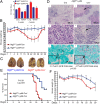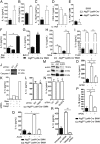Autophagy protects against active tuberculosis by suppressing bacterial burden and inflammation
- PMID: 23093667
- PMCID: PMC3503152
- DOI: 10.1073/pnas.1210500109
Autophagy protects against active tuberculosis by suppressing bacterial burden and inflammation
Abstract
Autophagy is a cell biological pathway affecting immune responses. In vitro, autophagy acts as a cell-autonomous defense against Mycobacterium tuberculosis, but its role in vivo is unknown. Here we show that autophagy plays a dual role against tuberculosis: antibacterial and anti-inflammatory. M. tuberculosis infection of Atg5(fl/fl) LysM-Cre(+) mice relative to autophagy-proficient littermates resulted in increased bacillary burden and excessive pulmonary inflammation characterized by neutrophil infiltration and IL-17 response with increased IL-1α levels. Macrophages from uninfected Atg5(fl/fl) LysM-Cre(+) mice displayed a cell-autonomous IL-1α hypersecretion phenotype, whereas T cells showed propensity toward IL-17 polarization during nonspecific activation or upon restimulation with mycobacterial antigens. Thus, autophagy acts in vivo by suppressing both M. tuberculosis growth and damaging inflammation.
Conflict of interest statement
The authors declare no conflict of interest.
Figures






References
-
- Mizushima N, Yoshimori T, Ohsumi Y. The role of Atg proteins in autophagosome formation. Annu Rev Cell Dev Biol. 2011;27:107–132. - PubMed
Publication types
MeSH terms
Substances
Grants and funding
LinkOut - more resources
Full Text Sources
Other Literature Sources
Medical
Molecular Biology Databases

